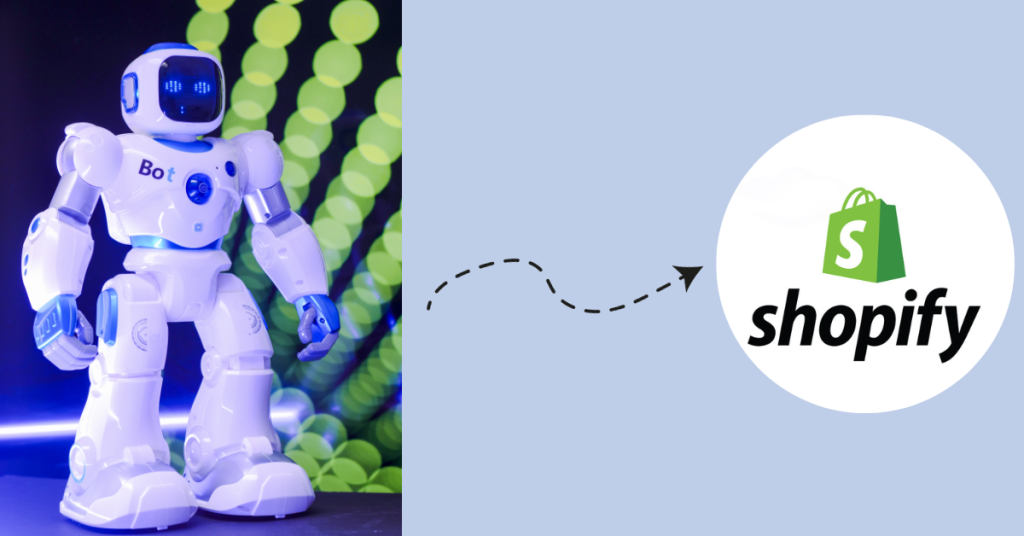AI In Ecommerce: Proven Ways to Increase Shopify Sales in 2023

Table of Contents
The Transformative Potential of AI for Shopify Sales
AI, or Artificial Intelligence, has revolutionized various sectors, and e-commerce is no exception. In today’s fast-paced digital landscape, online businesses need to stay ahead of the curve to thrive. Harnessing the power of AI can provide a significant edge, boosting sales, enhancing customer experiences, and streamlining operations. This article explores the transformative potential of AI for Shopify sales, analyzing the various benefits it offers.
AI catalyzes optimizing Shopify sales by leveraging advanced analytics and automation. By analyzing vast amounts of data, AI algorithms extract valuable insights to make informed business decisions. From inventory management to customer interactions, AI plays a pivotal role in elevating the eCommerce experience.
AI offers a myriad of benefits when it comes to optimizing Shopify sales. It enables businesses to identify purchase patterns, predict customer preferences, and optimize pricing strategies. By understanding customer behaviors, AI can help businesses target the right audience, resulting in higher conversion rates and increased sales.
In the realm of eCommerce, a seamless and personalized customer experience is paramount. AI-powered solutions enable businesses to create tailored experiences for each customer. By analyzing customer data, AI algorithms can recommend relevant products, provide personalized offers, and facilitate smooth interactions, ultimately fostering customer loyalty and satisfaction.
Inventory management can make or break an eCommerce business. AI-driven solutions make inventory management more efficient and accurate. By analyzing historical sales data, market trends, and customer behaviors, AI algorithms can optimize stock levels, prevent stockouts, and reduce excess inventory. This leads to improved operational efficiency, cost savings, and ultimately, increased profitability.
AI-powered analytics can segment customers based on various attributes, such as demographics, purchase history, and behavior patterns. This segmentation allows businesses to target specific customer groups with personalized marketing campaigns, leading to higher engagement and conversion rates.
By harnessing the power of AI, businesses can gain deep insights into customer behaviors and preferences. This enables targeted marketing efforts, ensuring that the right products are showcased to the right customers at the right time. AI-powered analytics can identify customer segments with high purchase intent, allowing businesses to allocate marketing budgets effectively and improve ROI.
AI-powered recommendation systems have become synonymous with eCommerce platforms. By analyzing customer data and leveraging machine learning algorithms, AI can generate hyper-personalized product recommendations. This not only increases the chances of upselling and cross-selling but also enhances the overall shopping experience for customers.
Automation is another area where AI shines in the eCommerce realm. By automating various stages of the customer journey, businesses can streamline processes, save time, and enhance overall efficiency.
E-commerce companies frequently struggle with cart abandonment. AI-driven checkout optimization can help minimize this issue by simplifying and streamlining the purchase process. AI algorithms analyze customer behavior, identifying potential pain points and optimizing the checkout flow to ensure a smooth and frictionless experience for customers.
Types of AI Technology Used in E-commerce
Artificial Intelligence (AI) is rapidly reshaping the e-commerce industry, enhancing customer experiences, optimizing operations, and increasing sales. There are several key types of AI technology that are actively used in e-commerce. In this article, we will explore these AI technologies and how they benefit online retailers.
1. Machine Learning
Machine learning is at the forefront of AI technology in ecommerce. It involves the use of algorithms that can analyze and learn from data to make predictions and decisions. Here are some of the ways machine learning is applied in e-commerce:
- Personalized Recommendations: Machine learning algorithms analyze customer behavior, purchase history, and preferences to offer tailored product recommendations, increasing the likelihood of sales.
- Inventory Management: Predictive analytics driven by machine learning help businesses forecast customer demand, optimize inventory, and reduce overstocking or understocking issues.
- Pricing Optimization: Machine learning algorithms can adjust product prices dynamically based on factors like demand, competitor pricing, and historical data, maximizing revenue.
2. Natural Language Processing (NLP)
NLP is used in e-commerce to process and understand human language. This technology is applied in the following ways:
- Chatbots: E-commerce websites often employ chatbots powered by NLP to provide customer support, answer queries, and assist in the shopping process.
- Search Functionality: NLP improves search capabilities, allowing customers to find products using natural language queries.
3. Computer Vision
Computer vision is a subset of AI that enables computers to interpret and understand visual information. It has significant applications in e-commerce:
- Visual Search: Customers can upload images to find similar products, making it easier to locate items they desire.
- Image Recognition: AI can recognize product attributes, which helps with tagging and categorizing products.
4. Sentiment Analysis
Sentiment analysis involves analyzing text data to determine the sentiment or emotion expressed. E-commerce companies utilize this technology to gain insights into customer opinions and improve their services.
- Product Reviews: Sentiment analysis helps businesses understand customer feedback, allowing them to make data-driven decisions to enhance product offerings and customer satisfaction.
7 Applications of AI in Ecommerce
Artificial Intelligence (AI) has become a driving force behind the success of many e-commerce businesses. Its versatile applications are transforming the online shopping experience, streamlining operations, and improving customer engagement.

Here are seven key applications of AI in e-commerce.
- Personalized Product Recommendations
- Predictive Analytics for Inventory Management
- Chatbots for Customer Support
- Visual Search and Image Recognition
- Sentiment Analysis for Customer Feedback
- Fraud Detection and Prevention
- Price Optimization
1. Personalized Product Recommendations
Utilizing advanced AI algorithms, we delve into a customer’s online journey, analyzing their browsing patterns and past purchase history to craft tailored product suggestions. Whether it’s suggesting related items, highlighting popular choices, or showcasing items frequently bought together, AI tailors the shopping experience to each individual, increasing the likelihood of making a sale.
2. Predictive Analytics for Inventory Management Predictive analytics powered by AI help e-commerce businesses optimize inventory management. By analyzing historical sales data and forecasting future demand, AI can recommend when and how much of a product to restock. This reduces the risk of overstocking and understocking, leading to cost savings and improved efficiency.
3. Chatbots for Customer Support AI-driven chatbots provide 24/7 customer support. They can answer common queries, assist with the shopping process, and even offer product recommendations. Chatbots enhance the shopping experience, offer quick responses, and can handle multiple inquiries simultaneously, increasing customer satisfaction and sales.
- Engage with customers in an effective manner: With their ability to manage straightforward transactions, process orders, and present tailored offers to clients, chatbots and virtual assistants make it simpler to manage a high volume of requests from a variety of point-of-sale (POS) channels, including online, mobile apps, and physical stores.
- Provide 24/7 client support: Your live support representatives may handle more complicated customer support issues by addressing complex chatbot and virtual assistant responses, which are available around-the-clock. AI can lower your customer support expenses by handling refunds and dispute resolution automatically.
- Compile client information: Chatbots and virtual assistants have the ability to gather client data, including dimensions and the purpose of the query, which can be used to improve customer support and product development.
- Make checkout better: In order to facilitate client inquiries regarding product specifics, quantities of highly desired items, and shipping details without requiring them to abandon their carts, online firms can also incorporate chatbots into their checkout pages.
4. Visual Search and Image Recognition
Visual search capabilities allow customers to upload images or use pictures to find similar products. AI-powered image recognition technology can identify product attributes and features, making product search more intuitive and accurate. This feature is especially valuable in fashion and home decor e-commerce.
5. Sentiment Analysis for Customer Feedback
Sentiment analysis, a subset of natural language processing (NLP), is used to analyze customer reviews and feedback. AI tools can determine the sentiment or emotion expressed in customer comments. This helps e-commerce businesses understand customer opinions, identify areas for improvement, and enhance their product offerings and services.
6. Fraud Detection and Prevention
AI technology plays a crucial role in preventing fraudulent activities. Machine learning algorithms analyze transaction data to identify suspicious patterns, such as unusual purchase behavior or irregular payment methods. By quickly flagging potential fraud, AI safeguards e-commerce businesses and customer data.
7. Price Optimization
AI can dynamically adjust product prices based on various factors, including demand, competitor pricing, and historical data. This allows e-commerce businesses to implement dynamic pricing strategies that maximize revenue. By offering competitive prices while maintaining profitability, AI can contribute to higher sales and increased revenue.
These seven applications of AI in e-commerce represent just a glimpse of the technology’s potential in transforming the online retail landscape. As AI continues to evolve, e-commerce businesses will likely find even more innovative ways to leverage its capabilities to meet customer expectations, streamline operations, and ultimately boost sales.
Shopify’s AI Initiatives
Shopify, a leading e-commerce platform, has embraced AI to empower businesses and improve their overall performance. Some key ways Shopify uses AI include:
- AI-Powered Storefronts: Shopify offers AI-powered storefronts that adapt to each visitor’s preferences. These storefronts display products and content that are most relevant to the visitor, creating a highly personalized shopping experience. This personalization encourages customer engagement and, in turn, drives sales.
- Inventory Management: Shopify’s AI tools help businesses manage their inventory efficiently. By analyzing sales data and trends, the platform provides inventory recommendations, reducing the risk of overstocking or understocking. This not only helps save costs but also ensures products are available when customers want to buy them.
Benefits of Using AI in Ecommerce
In the ever-evolving world of ecommerce, businesses are constantly seeking ways to gain a competitive edge. The adoption of Artificial Intelligence (AI) has proven to be a game-changer in this quest, offering a plethora of advantages that can significantly boost a company’s success. In this article, we will explore the key benefits of using AI in ecommerce, which include increased sales, better and more personalized customer service, and the efficient reallocation of time and resources.
- Increased Sales: AI in ecommerce empowers businesses to harness the power of data-driven insights. By analyzing customer behavior and purchase history, AI algorithms can make product recommendations tailored to each individual’s preferences. This personalization not only enhances the shopping experience but also increases the likelihood of making a sale. Moreover, AI can optimize pricing strategies, ensuring that products are competitively priced in real-time, further enticing customers to buy.
- Better and More Personalized Customer Service: AI chatbots have revolutionized customer support in ecommerce. These intelligent bots are available 24/7 to answer queries, resolve issues, and provide information. They offer a seamless shopping experience and reduce the burden on customer service teams, leaving customers more satisfied.
- Reallocation of Time and Resources: AI automates various tasks, such as data analysis, customer segmentation, and inventory management. This allows businesses to reallocate human resources to more strategic activities, like marketing and product development. It also leads to cost savings and increased operational efficiency.
The incorporation of AI in ecommerce is not just a trend; it’s a strategic move for businesses looking to thrive in the digital age. The benefits of increased sales, personalized customer service, and the efficient use of time and resources make AI a valuable asset in the world of online retail. Embracing this technology can drive growth and profitability, making it an essential tool for modern ecommerce businesses.
Challenges of using AI in ecommerce
AI in ecommerce has the potential to revolutionize the industry, but it also comes with its own set of challenges. In this article, we will explore three significant challenges associated with the integration of AI in ecommerce.
-
Potential for Poor-Quality Customer Service
AI-driven customer service has become increasingly popular in the ecommerce sector due to its efficiency and cost-effectiveness. However, it is not without its challenges. One of the primary concerns is the potential for poor-quality customer service when AI is not properly implemented or monitored. Let’s explore a few important concerns:
a. Lack of Personalization: AI-driven chatbots and automated customer service systems may struggle to provide the level of personalization that customers expect. They may offer generic responses that do not adequately address individual customer needs and preferences.
b. Misunderstanding Customer Queries: AI systems may misinterpret customer queries, leading to incorrect or irrelevant responses. This can frustrate customers and harm the overall shopping experience.
c. Inability to Handle Complex Issues: While AI can handle routine inquiries effectively, it may struggle with complex issues that require human intervention. This situation might just leave your customers feeling frustrated and unsatisfied.
To address these challenges, ecommerce businesses need to strike a balance between AI automation and human support, ensuring that AI systems are well-trained and regularly updated to provide high-quality customer service.
-
Data Privacy
The use of AI in ecommerce involves the collection and analysis of vast amounts of customer data. While this can be valuable for personalization and targeted marketing, it also raises significant concerns about data privacy and security. Here are some key data privacy challenges:
a. Data Breaches: Storing sensitive customer data can make ecommerce businesses more vulnerable to data breaches. If we don’t take proper precautions to secure our AI systems, they could end up being tempting targets for cyberattacks, and we want to avoid that!
b. Consent and Compliance: Stricter data protection regulations, such as GDPR, require businesses to obtain clear consent from customers for data collection and processing. Ensuring compliance can be challenging, particularly when using AI for data analysis.
c. Trust and Transparency: Customers may be apprehensive about sharing their data with AI-driven systems. Building trust and transparency in data usage is crucial to assuage these concerns.
Ecommerce businesses need to invest in robust data security measures, prioritize compliance with data protection laws, and communicate their data handling practices clearly to customers to mitigate these data privacy challenges. -
High Initial Investment
Implementing AI in ecommerce can be a costly endeavor, and many businesses may struggle with the initial investment required. Here are some cost-related challenges:
a. Infrastructure and Technology Costs:
Developing and maintaining AI systems, along with the necessary infrastructure, can be expensive. This includes the costs of software, hardware, and skilled personnel.
b. Training and Integration:
Training AI models, integrating them into existing ecommerce platforms, and ensuring they work seamlessly with other systems can require significant resources.
c. Ongoing Maintenance:
AI systems require continuous updates, maintenance, and monitoring, which can result in ongoing expenses.
To address these challenges, businesses should carefully assess their AI implementation strategies, consider outsourcing AI development and maintenance if necessary, and weigh the long-term benefits against the initial costs.
Conclusion:
The incorporation of AI in ecommerce is not just a trend; it’s a strategic move for businesses looking to thrive in the digital age. The benefits of increased sales, personalized customer service, and the efficient use of time and resources make AI a valuable asset in the world of online retail.
Embracing this technology can drive growth and profitability, making it an essential tool for modern ecommerce businesses. So, don’t miss out on the AI revolution. It’s the key to success for your Shopify store in 2023 and beyond!
Also Read:
Starting an E-Commerce Business From Scratch – Shopify Win
Unlock 10 Shopify Apps to Help Your E-commerce Store In 2023 (shopifywin.com)



